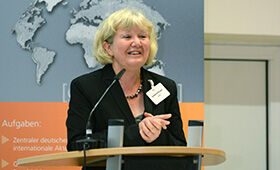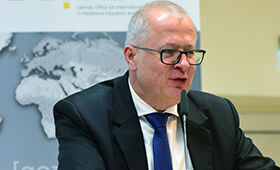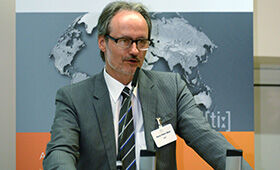Conference on the implementation of the strategy for international cooperation in Vocational Education and Training
Three years ago the strategy of “one-stop VET cooperation” was adopted by the Federal Government. 50 representatives of organisations involved in international VET cooperation have now met in Berlin to take stock. The aim was to discuss together the extent of the progress made with the implementation, what still needs to be done and how international collaboration in vocational education and training should be developed further.

In addition to “Round Table” members, experts from abroad had travelled to the conference, organized by GOVET, in order to provide an insight into practice at a local level. Susanne Burger of the Federal Ministry of Education and Research (BMBF), Dr. Tilo Klinner of the Foreign Office (AA) and Hans-Peter Baur of the Federal Ministry of Economic Cooperation and Development (BMZ) introduced the event and welcomed all participants. The event was chaired by Kate Maleike from Cologne.

Dr. Nolitha Vukuza, who is the Higher Education and Training Representative for UNESCO, OECD, ILO, Germany and Switzerland at the South African embassy in Paris, reported on the cooperation with Germany from the perspective of a long-standing partner in her keynote address. She advo-cated for cooperation on an equal footing with greater clarity of responsibilities on the German side and called for discussion of conditions in the partner countries in greater depth - i.e. what is actually wanted and what are the opportunities, the institutional requirements and how all this fits in with the German approach. According to Dr. Vukuza, so much could be achieved in this way: “Alone I walk faster – but together, we walk far!”

Practitioners in international VET cooperation had the opportunity to speak on the topic of the co-operation of German organisations abroad in the podium discussion which followed. Ladislav Chudy (Manz Slovakia), Dennis Horch (GIZ [German Agency for International Cooperation]), Britta Buschfeld (Chamber of Foreign Trade, Shanghai), Martina Klumpp (German Embassy in Mexico) and Ulrich Nordhaus (DGB [Federation of German trade unions]) described their experiences with the introduction of German training standards and vocational training concepts abroad, with the coordination of German stakeholders among themselves and also described how international VET cooperation might be further developed. Specialist input from the academic perspective was pro-vided by Prof. Dr. Matthias Pilz (Cologne University) who presented the empirical results of a cur-rent research project looking into the training requirements of German companies in newly indus-trialised countries.

In the afternoon, conference participants addressed the achievements and limitations of German collaboration in vocational education and training abroad based on the themes of “Consolidation of the vocational education and training system in partner countries” and “Supporting the German economy abroad by means of VET cooperation” Here it was found that the two themes are closely related to one another and linked to similar challenges, for example in relation to the flow of in-formation from the partner countries and the issue of the extent to which typical German voca-tional education and training approaches should be adapted to conditions abroad without diluting these too much in the process.
In a concluding round of discussion, which Volker Rieke of the Federal Ministry of Education and Research introduced with a thought-provoking presentation, the results of the conference were summarised and the next steps were identified. The coordination processes which were initiated in 2013 by the setting up of GOVET and the Round Table for international VET cooperation have facilitated the work of the German stakeholders. However, this path still needs to be pursued more systematically. Many participants, for example, expressed the desire for more information from abroad, for more transparency concerning vocational education and training activities available there, and for more teamwork amongst themselves. The area of conflict between market-based vocational education and training export and political vocational education and training cooperation was addressed on multiple occasions - two areas however, where potential cross-fertilization exists. International VET cooperation should, if nothing else, address the new chal-lenges such as the themes of “Refugees and migration” or the “Sustainable development goals of agenda 2030”.


